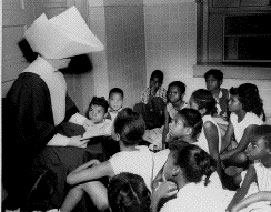The Catholic University Archives originated before World War II when Monsignor Francis Haas began collecting the papers of important Catholic labor leaders such as Terence Vincent Powderly, head of the Knights of Labor, and John Mitchell, president of the United Mine Workers. These papers were stored in Mullen Library on campus, but there was no staff to help arrange them and make them available for scholarly investigation, nor even rooms where scholars might use them. After the war, members of the history department, particularly the Rev. John Tracy Ellis, began to worry that the history of the university and the history of Catholic Americans generally was being lost through neglect of vital records and papers. In 1949, because of the energetic advocacy of the Rev. Ellis, a committee composed of Monsignor Edward Jordan (the vice rector), Mr. Eugene Willging (acting director of the library), the Rev. Peter Hogan, S.S.J., and the Rev. Henry Browne (also of the history department), was formed to plan the establishment of an archives at Catholic University. The role of the archives, the committee envisioned, would be to serve as the "memory" of the university, a depository for the papers and records of the nation's Catholic leaders and important organizations, and a resource for the history of participation by American Catholics in the American labor movement.
On December 8th of 1949, the Feast of the Immaculate Conception, the university officially opened the archives in an impressive ceremony that included Wayne Grover, the archivist of the United States;

Archbishop O'Boyle, chancellor of the university; Ernst Posner, then archivist of American University and later a seminal theorist of archives; Philip Brooks, president of the Society of American Archives; and Dr. Guy Ford Stanton, executive director of the American Historical Association. Grover, Posner, and Ellis all spoke of the importance of archives in the preservation of culture, and more specifically, of the Catholic Church's long tradition as a keeper of historical records. Ellis also speculated on the future of the new Catholic University Archives, hoping that it would become a national "research center" for the study of American Catholicism.
The Archives developed quickly in its first decade under the leadership of distinguished historians Father Henry Browne and Monsignor Robert Trisco. Through their work and that of their successors, particularly Drs. Anthony Zito and Timothy J. Meagher, the archives has grown today to include nearly 14,000 feet of records and manuscripts, which does not include the museum collection. As the official depository for such organizations as the National Catholic Education Association, the National Conference of Catholic Charities (now Catholic Charities USA), the National Councils of Catholic Women and Men, and most importantly, and the United States Conference of Catholic Bishops, it is unrivaled as a source for the history of the American church's central institutions in the 20th century. In addition, the archives holds the personal papers of several of the 20th century's most distinguished American Catholic thinkers: social theorists Monsignor John A. Ryan and Monsignor Paul Hanley Furfey, anthropologist Monsignor John Montgomery Cooper, and historians Monsignor John Tracy Ellis and Monsignor Peter Guilday. Labor history, an original focus of the archives, remains an important strength. Over the last six decades the archives has collected the papers of Philip Murray, president of the Congress of Industrial Organizations (CIO); John Brophy, national director of the Congress of Industrial Organizations; and Richard Lawrence Deverall, labor activist who participated in the reconstruction of Japan after World War II. It also has acquired the early Records of the Congress of Industrial Organizations.
The Archives, of course, remains as well the institutional "memory" of Catholic University. In addition to the records of the university's board of trustees, rectors and presidents, and vice presidents, the archives has collected the files of several of the university's departments: the personal papers of critical leaders from Bishop Thomas J. Shahan, fourth rector of the university, to Dr. C. Joseph Neusse, sociologist, historian of the university, and recent provost; and campus publications such as the Tower student newspaper, the Cardinal yearbook, and the old Catholic University Bulletin.
For additional information see the Index of Manuscript Collections.
See additional information from the blog entries:
